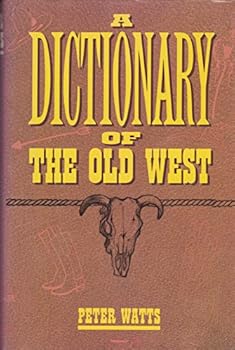Dictionary of the Old West
Select Format
Select Condition 
Book Overview
The hybrid language of the frontier is revealed in this compilation of terms used by the cattlemen, frontiersmen, scouts, cowboys, and gamblers.
Format:Hardcover
Language:English
ISBN:0517119137
ISBN13:9780517119136
Release Date:September 1994
Publisher:Random House Value Publishing
Length:399 Pages
Weight:1.68 lbs.
Dimensions:10.0" x 1.5" x 6.5"
Customer Reviews
2 ratings
darn tootin best dictionary on the Old West ever!
Published by Thriftbooks.com User , 24 years ago
Normally, I am not a big fan of Westerns, either novels or movies (or TV series or even really non-fiction works either), but I couldn't resist this book. This almost 400 page work details exhaustively any Western term, definition, piece of equipment, animal, plant, or slang you could ever want to have defined. Some examples? Sure! Many slang terms are defined. Above my huckleberry means basically out of one's control. A granger was a settler or farmer, as opposed to a cattleman. A soiled dove is a prostitute. A grub pile is cooked food; a meal. A mockey is a wild mare. Watts details more than fun to read slang though. He has some fairly extensive definitions as well. You learn that the term ghost town was probably never even used in the 19th century for instance. There is a nice map and defintion for cattle trail, showing the route of the Chisolm Trial, the Shreveport Trail, and others. There is more cattle and horse related terms than you ever imagine, from entries on castration to hot-bloods to peggers to under-bits. There is an extensive discussion of stampedes, particularly on how they relate to writers of fact and fiction. Many defintions are accompanied by 19th century style illustrations or rarely photographs, often showing equipment such as pole fences, chuck wagons, soddies, and mantillas and animals and plants such as elks, prickly pears, heelers, grizzly bears, and burros. So if you have even a slight interest in the Old West, rattle your hocks and get this book! It's a mother lode of terminology, fits for fans of the history of the Old West or of novels and movies set in it.
Watts has done an admirable job.
Published by Thriftbooks.com User , 26 years ago
Peter Watts' stated purpose was to create a guide for the readers of Western Americana - to identify the words and phrases used in the Old West during the period 1850-1900. He furnishes the "how" and "why" of standard range words such as: roping, brands, saddles, trail drives, and so forth. Watts faced several obstacles in the preparation of this book. A major obstacle was separating words, which originated in the writings and communications of the twentieth century, from those which were actually used on the western frontier. Watts freely admits he wasn't always successful in separating genuine words from admixed and adulterated words.Another problem was the discovery that 19th century records, diaries, et. al., listing eyewitness' accounts of historical events, contained an abundance of misspelled or inaccurate words and phrases. Watts offers little help in proper pronunciation because there is no way of knowing how some words were pronounced by people long dead. In their lifetimes, the western pioneers heard various colloquialisms, sometimes incorrectly, and often mangled words and their meaning when making conversation or when keeping diaries and other records.Another factor was the polygot population inherent on the American frontier. Anglo- Saxons brought English and Celtic words to the United States, some of which were further influenced by the speech and pronunciation used by Africans, Spaniards, and people of French descent. Gold seekers from Europe, American Indians, Metis, Dutch, Swedes, Swiss, and many other races also contributed to the words and phrases used throughout the Old West.Cattle range words generally originated with the Mexican vaquero. These words were changed, twisted, and combined with English by the American Cowboy into the range language often used today. Language grows healthy and powerful with the infusion of words from the various strata of a society and this held true in frontier America. Watts contends the educated class causes a language to lose its rich taste, its contact with all the people, and its very means of renewal unless lower class words are continually being added.This book is incomplete but not by design. It was an impossible task to capture every frontier word and phrase; however, Watts has done an admirable job under the circumstances. He used reliable sources such as Andy Adams and Ramon Adams, used a number of dictionaries, and read the works of western fiction writers Wister, Haycox, Grey, L'Amour, Short, et al., in order to identify crucial words used in the Old West.This is a pretty good book which will prove of immediate value to readers interested in Western Americana. Watts' book is as complete and as accurate as time and circumstances have allowed.





